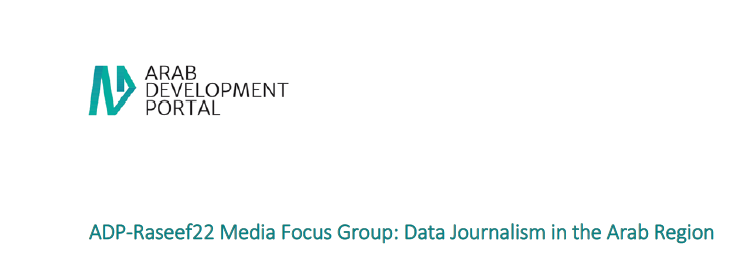‘Arap Coğrafyasında #VeriGazeteciliği’ Konferansı
“Arap Coğrafyasında #VeriGazeteciliği” Konferansı Düzenleniyor. The Guardian, Statista, #DağMedya, AlJazeera’dan isimlerle birlikte bölgeden veri gazetecileri Beyrut’ta toplanıyor. Konferans Arap Coğrafyasında Veri Gazeteciliği’nin nasıl daha etkin kullanılabileceğine dikkat çekmeyi hedefliyor.
Crowne Plaza Hotel, Beirut, 30 March 2017
Enhanced open data facilities and increased provision of statistics in the Arab region offer journalists a new source of “interesting and new stories” that can contribute to unravelling societal controversies and highlighting political and economic marginalization and injustices. Indirectly, journalists have at hand a powerful tool that can contribute to holding policy‐makers and actors in the position of power accountable. This is a role that is fully practiced in North American and European media outlets. Other regions are also following suit. However, only recently did journalists in the Arab region pay attention to the power of data as an investigative tool and as a promising platform.
In previous times, information was scarce and the efforts of journalists were devoted to gathering information from different sources, e.g. through direct interviews, field visits, desk research (to acertain degree), etc. where personal contact is key. Now bigger data flow is more easily available and offer Arab journalists an opportunity to explore other means of reporting, i.e. that of what isreferred to as “data journalism”. As such journalists need to have the basics: (1) how to process and analyse data, (2) how to present data that is comprehensible by the public. The focus should not only be about analysing and visualizing data only, it is rather about using the numerical data as a tool to produce fact‐based, verified, engaging and relevant reporting and to produce datadriven stories in an appropriate and attractive way. In brief, data journalism is bringing sense and structure to the never‐ending flow of data and present it in a relevant way to the mass.
The above and other subjects will be discussed thoroughly in ADP‐Raseef22 Media Focus Group on Data Journalism in the Arab Region, which will bring together 20 journalists. The Focus Group Meeting will look as well into the developing trends in data journalism and create an opportunity to share experiences, best practices and knowledge while addressing the below:
Is getting stories from data considered journalism? Where does the Arab region stand in this? Are data on the Arab region available and accessible? What are the challenges that the journalists face when covering the Arab region? What are the needs of journalists to be able to play a more activerole in making sense of the flow of data?
Program
Introduction and framing session:
9:00 – 9:30 Farah Choucair, ADP Project Coordinator, UNDP‐RBAS
9:30 – 11:30 Session I: Status of data journalism in the Arab Region
o What is the status of data journalism in the Arab region and how does it compare to other regions?
o Who has led the emergence of data‐driven journalism in the Arab region(actors and countries)? What factors facilitated this rising trend?
o Why is data‐driven journalism important and how can it be integrated in“traditional journalistic coverage”?
o Has data journalism succeeded to establish a base of followers/readers?
o How is data journalism affected by access to data and open government data?
o What are the challenges of data journalism in the Arab region?
Moderator: TBD, Raseef22
Speakers:
Raseef 22 [Overview of status of data journalism in the Arab region]
Lina Ejeilat, 7iber [Challenges of data journalism in the Arab region]
Alaa Batayneh, AlJazeera [Emergence of data journalism and how it succeeded in establishing a base of followers]
Alya Alaali, Bayanat Box [Access to data in the Arab region]
Ahmad Barclay, Visualizing Palestine
TBD
Open discussion
11:30 – 11:45 Coffee break
11:45 – 13:45
Session II: Data journalism techniques
o Finding the meaning/story in datasets
o Contextualizing data analysis
o How raw data can be turned into eye‐catching visual stories
o Data journalism tools
o Reaching out to readers
o Best practices
Moderator: Raseef22
Speakers:
Inkyfada & VP [Relation between Journalist, designer and developer]
Eva Constantaras, Internews [From data to stories: strategies for using big
data and setting up data teams]
Raseef22 [Data journalism and social media: a boosting tool]
13:45 – 15:00 Lunch break
15:00 – 16:00
Session III: Big data and the future of journalism
Presentations by:
Pinar Dag, Dağ Medya
Mona Chalabi, The Guardian
Dyfed Loesche, Statista
Open discussion
16:00 – 17:00
Session IV: Data journalism as an advocacy tool?
o How big data is becoming a resource for social positive change and how is it being used?
o What role does data journalism play in stimulating evidence‐based advocacy campaigns?
o Obstacles to using big data in supporting positive change
Best Practices by:
Husam Alkatlaby
Hussein Kassab, Data Aurora
Open discussion
17:00 – 18:00
Session V: Needs of data journalists
o Making sense out of the flow of data
o Interpreting and presenting data
o Selecting the right data
o Responsible use of data, ethical concerns
o Data availability in the Arab region
o Integrating data journalism into the newsroom
Open discussion
Dissemination of needs’ assessment questionnaire
